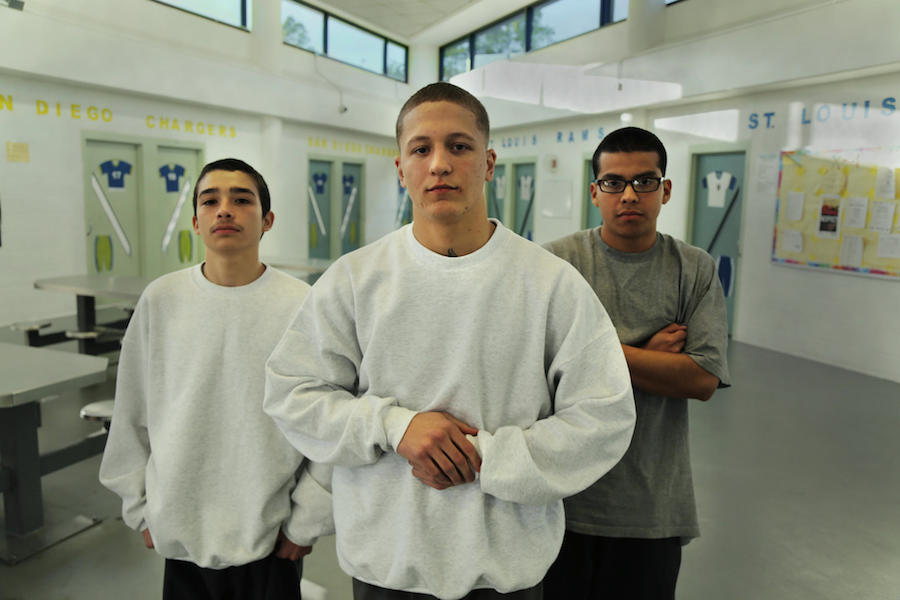Ben Lear‘s acclaimed documentary, “They Call Us Monsters,” will be available on Netflix starting tomorrow, May 30th. It explores the lives of three juveniles faced with the possibility of being sentenced to life in prison. The passing of California’s Senate Bill 260 could offer these young men a second chance at freedom, though the cyclical poverty in their community makes it difficult for them to rise above their circumstances. Only through the screenwriting classes offered by the InsideOUT Writers program in prison do they find a constructive outlet for their creativity.
In his review of the film, RogerEbert.com‘s Matt Fagerholm wrote, “The most touching scenes in Lear’s film center on Juan, the other juvenile tasked with coauthoring the script. He has a baby son waiting for him at home, though his chances at fathering him in America are rendered impossible by his sentencing, which requires him to be deported as soon as he leaves prison. There’s an especially heartrending shot of Juan’s little boy walking between his father’s legs bound with shackles. When Cowan asks him about his fears, Juan opens up about a close friend that he had always lusted after in secret, afraid that she wouldn’t have the same feelings for him. This woman ends up inspiring one of the characters in the completed film, which Despres cuts to in fleeting edits, as if the vivid imagery has leapt straight from the writers’ imaginations. Cowan even recruits actors Nate Corddry and Nora Kirkpatrick to act out scenes from the script while under the kids’ direction. Hearing his own words delivered back at him, fraught with his own insecurities, proves to be painful for Juan, and in a sequence of aching vulnerability, he calls his friend from prison and is able to finally come clean about his feelings for her. Instead of merely confessing, Juan uses the scenes from his film to describe his long-suppressed infatuation, demonstrating how art can bring into light what is otherwise left in the shadows.”
Ben Lear and producer Sasha Alpert participated in an onstage Q&A following a screening of “They Call Us Monsters” at Ebertfest this year. Below is a video of the Q&A preceded by an excerpt of Chaz Ebert’s interview with Lear published at RogerEbert.com.
What is it about someone younger than the age of 18 that makes it inappropriate to sentence them to life in prison or the death penalty for a crime they commit at that age?
This is a very important question. To punish someone for the rest of his or her life for a crime committed under the age of 18 ignores the scientific fact that “kids are different from adults.” The prefrontal-cortex doesn’t fully develop until our mid-late 20s, making it impossible to know for certain who a 14-year-old will become ten years later. To deny him/her the opportunity to earn a second chance as a chemically new person seems cruel to me. This science has influenced a handful of supreme court decisions, which have subsequently mandated states to change their laws.
Now, these are my personal beliefs. It was very important to me that the film does not hammer you over the head with them. Because, yes, the science is real, but so are the heinous, irreversible crimes they committed. The victims, who will never walk or take a breath again. Determining how to treat these young people is an incredibly difficult task that requires serious, individual thought. Everyone needs to make up their own minds on this one!
Your film achieves a surprising balance in that you don’t sugar coat what the juvenile offenders are guilty of. In fact, you show how one of the victims will have to live with the consequences of their actions. What thinking went into that formulation?
I have to give credit to Sasha Alpert, one of the producers. She helped the project enormously. When Sasha came along with the support of her company, BMP Films, she did the opposite of what you would expect any large production company to do—she challenged me as a director to make the film more thoughtful, more nuanced, more interesting. Most importantly, she pushed me to reach out to the victim of one of the boys’ crimes. I had always wanted to tell the victim’s side of the story but to be honest, I was nervous to actually make contact. To tell this woman, who would be handicapped for the rest of her life, that I’m making a movie about the man who put her there. But, of course, that was exactly why it was so important to include her—to balance that story. To ensure the film is, like Sasha urged, more thoughtful and nuanced. Unbiased.
For more information on “They Call Us Monsters,” visit the film’s official site.











